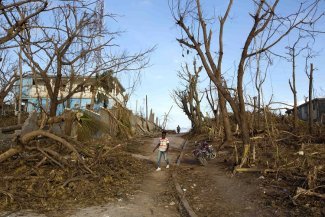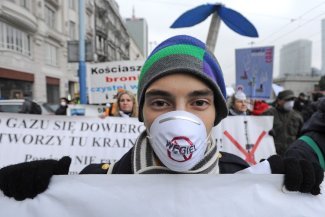Police stand around a demonstrator blocking a road during an Extinction Rebellion climate change protest in Parliament Square, London, on 1 September 2020.
Nicholas Sheldrick was never a protester, nor would he have described himself as an environmentalist, until one day in 2011 he felt the tremors of an earthquake induced by fracking, the controversial process of the hydraulic fracturing of shale rock to recover gas. He then started looking into its impacts, which include water pollution from toxic chemicals, as well as peer-reviewed studies connecting the fracking boom in the United States to massive methane emissions. Still, it took a few more years before he decided to join the anti-fracking movement.
Sheldrick lives near Preston New Road (PNR) just outside of the English seaside town of Blackpool. In 2016, it became the epicentre of the UK climate protest movement when the government overturned a local authority’s decision to refuse permission to Cuadrilla, the UK’s leading fracking company, to begin shale gas exploration and fracking at PNR and the nearby Roseacre Wood.
On 3 July 2017, Sheldrick took part in his first protest at the Cuadrilla site. “We went to the gates at 3am so that we could catch security off-guard. I put myself out of my wheelchair onto the ground and we locked on,” recalls Sheldrick, who was part of a group of 13 protesters that blocked entry to the site gates until 7pm that evening.
Sheldrick, a former merchant naval officer, locked-on outside the company gates twice, despite facing physical and verbal violence from the police, for which he eventually received £25,000 in compensation. “I wanted to raise awareness to other locals that if I can shut this place down, that we could do it together.” His protests, and others, were a significant part of the public pressure that led to a government-imposed moratorium on fracking being issued in England in 2019.
The anti-fracking movement is a clear example of the power of protest in the context of the climate emergency.
But as environmentalists in the Global South – particularly in Latin America – face increasingly deadly risks, in a growing number of industrialised countries that bear the largest historical responsibility for the current climate emergency freedom of assembly and the right to protest are also under threat. This includes the United Kingdom where crucial climate talks will be taking place in Glasgow from 31 October to 12 November.
In April, over 400 climate academics signed an open letter urging governments to “stop attempts to criminalise non-violent climate protest”, prompted by what they observed as a growing number of “those who put their voices and bodies on the line to raise the alarm… being threatened and silenced by the very countries they seek to protect”.
Julia Steinberger, a lead author with the United Nations’ Intergovernmental Panel on Climate Change (IPCC) and a professor in ecological economics at the University of Lausanne in Switzerland, was one of the signatories to the letter. She tells Equal Times: “We wrote the letter as governments previously took no climate action saying no-one cared. Now worldwide there is concern and millions of youths are on the street. But in response, we just have cosmetic climate [action] and the criminalisation of protest. Clearly, governments are siding with fossil fuels against the people.”
She says that “2018 was a key year with the global climate movement surging from Standing Rock to the student protests, from the special report about 1.5 degrees to the first Extinction Rebellion (XR) protests. But as popular movements become more visible, so does the backlash.”
“We only have two or three years left to make a difference”
A growing body of research and indisputable evidence of the year-on-year increase in life-threatening climate events have helped put the climate emergency under the global spotlight, but it is civil disobedience and grassroots activism that have been key in the attempts to force the urgent political and social change required to prevent total climate breakdown. It is against this backdrop that on 9 August 2021, the IPCC started releasing its sixth round of reports, with UN Secretary-General António Guterres declaring them a “code red for humanity”.
But despite this clarion call, non-violent environmentalists are being scapegoated and targeted by authorities in what has been dubbed a global resurgence of the so-called ‘Green Scare’ of the early 1990s, where some radical environmental groups in the US were defined and treated as domestic terrorists. We saw an example of this just before the 2015 Paris Climate Summit, where French climate activists were pre-arrested using anti-terror laws. Since 2016, at least 18 US states have used national security legislation introduced after 9/11 to crackdown on peaceful climate protests. In Australia, state authorities are taking a tough line against environmental protesters with fines for ‘trespassing’ and potential imprisonment for locking-on. And even the Council of Europe has called for an end to the escalation in state repression against climate protests: “Let us reverse the trend and make Europe a safe place for environmental activism,” it implored.
In the UK, which is hosting COP26 later this year, the Conservative government is currently pushing through a sweeping Police, Crime, Sentencing and Courts Bill, which human rights NGO Liberty has described as “one of the most serious threats to human rights and civil liberties in recent [UK] history.” As well as handing the state sweeping new powers to restrict the right to protest and freedom of assembly by criminalising “noisy” demonstrations, it also gives police more powers to arrest people for non-violent protests and is likely to disproportionately impact Gypsy, Roma and Traveller communities by criminalising trespass.
According to Friends of the Earth, the Bill threatens to silence and criminalise the kind of direct action that it has engaged in for decades: “The future of the planet and humanity depends on peaceful protests,” it warned in March.
One of the key battlegrounds for climate action in the UK is the ongoing construction of a £100 billion high-speed train-line known as HS2. The government says the project is a vital part of the UK’s plans to reach net-zero by 2050 but environmental campaigners say the project threatens ancient woodlands and will cause irreparable damage to wildlife. There has been sustained direct action against HS2 ever since construction began last year, and according to the Guardian, as of June 2021, police made over 300 arrests, with nine prosecutions.
One of the focal points of the protests was Euston, a major transport hub in central London, where activists dug tunnels to prevent construction of the new high-speed railway lines. Larch Maxey, a climate change activist and former University of Swansea geography lecturer, spent almost a month living below Euston in an underground tunnel in early 2021. “The police have always been manipulative and repressive at protests,” Maxey says, giving the example of undercover police officers who infiltrated peaceful activist groups over many years. “But what we are seeing now is the police blatantly in the pay of HS2,” he says, referring to the ‘Enhanced Police Service Agreement’ signed by British Transport Police and HS2 Ltd, under which HS2 pays for three members of additional policing staff.
Maxey was an academic for 25 years but says “I can no longer justify doing research and teaching to bring about change when the UK’s ex-chief scientist, Sir David King, says we have just two to three years left to make a difference. We need civil disobedience and direct action through a mass movement.” Climate scientists have been too slow in explaining the escalating catastrophe, he says. By contrast, Steinberger shares how physicists, including her parents, took a decisive stand against nuclear weapons from the 1950s onwards. As an explanation for the relative reluctance of some climate scientists to do the same for climate change until recently, she suggests: “People thought the technocratic solutions would work when the crisis became clearer...[.] Some parts of the climate community, especially senior scientists, don’t want to lose [control of] the narrative to the masses”.
Bad COP, worse COP
With average global temperatures already at 1.2 °C above pre-industrial levels, in April’s open letter, scientists assert that this year’s delayed climate summit marks “a critical year for climate governance”. In this context, the UK’s protest crackdown is even more significant. “Civil society plays a crucial role shining a light on the shenanigans, but negotiators go to these summits with their marching orders [from their governments]. It is what happens before that counts,” Steinberger says. If people cannot undertake civil disobedience action, such as protests, before the summit to grab the attention of the media and general public, then policymakers may not feel the pressure needed to take ambitious climate action to prevent the worst consequences of climate change.
UK climate protests will turn up the heat before the COP starts at the end of October. XR held a two-week rebellion starting on 23 August, with school strikes climaxing globally on 24 September. In addition, there are a swathe of actions planned, dubbed #KilltheBill, against the new crackdown on protests and liberties.
COP26 will be the first climate summit to take place since the world’s nations submitted their National Determined Contributions (NDCs), which outline their commitments to cut greenhouse gas emissions. Historically, the UK and US have the highest per-capita responsibility for the climate crisis but climate activists say that not nearly enough is being done by these countries to cut emissions and ensure a just transition to a low-carbon economy.
“With Biden as president [of the United States] nothing has changed. If it had, these big oil companies would be re-evaluated, or shut down,” explains Cleo Otero from the Diné and Hopi First Nations in the United States, who spoke to Equal Times between visits to protest camps resisting the Line 3 tar sands pipeline traversing Minnesota.
Corporation Enbridge’s Line 3 will pump Canadian tar sands, an extremely dirty fossil fuel, to the US city of Wisconsin. Indigenous-led resistance is fighting against this pipeline, which will desecrate and destroy First Nation lands, including the Mississippi River. “We are not only protecting water,” says Otero. “We protect bodies, as we are made of up to 90 per cent water. Water is sacred. It is in everything, the plants, our food – we are protecting life.”
Water protection is a strategy that was popularised in the successful 2016 Sioux Standing Rock resistance to the Dakota Access Pipeline in North Dakota. The idea has now spread globally, with activists blocking fossil fuel projects, something 25 climate summits have successively failed to achieve. The climate scientists involved with the letter are calling for new, viable decarbonisation pathways, including the Green New Deal, climate jobs and environmental restoration. “The obstacle is the way our political and economic systems are constituted,” says Steinberger. And given the current political landscape, only civil disobedience is likely to be able to change that.













